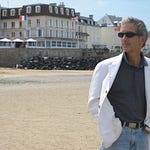Listen here, on Spotify, Apple, or wherever you listen to podcasts by searching for ‘Climate Papa.’
What if the most important step you can take for biodiversity is simply… noticing?
Species are disappearing far faster than we can track, and for many of them, our entire scientific record amounts to a handful of specimens scattered across museum shelves.
My guest today, Scott Loarie, has spent the last decade building one of the most hopeful counterforces to that trend: iNaturalist. What started as a simple idea — “What if anyone could help record the living world with their phone?” — has grown into one of the largest biodiversity datasets on Earth. Most of what scientists now know about many species comes not from elite field research, but from millions of everyday people noticing what’s around them.
We talk about how climate change scrambles ecosystems, how citizen science has outpaced some traditional biology, and why biodiversity may be one of the last unpolarized environmental spaces left. iNaturalist works not because it’s high-tech, but because it taps into something deeply human: curiosity. A butterfly in your backyard becomes a datapoint for global science. A moment of noticing becomes a contribution that actually matters.
In a world where climate action often feels abstract and distant, biodiversity offers something intimate: a reason to look closer.
If you want to start, download the iNaturalist app, step outside, and snap a photo. It’s a tiny act that scales surprisingly far.
Referenced:
Seek — for under 13
Get connected:
Scott Loarie — iNaturalist | LinkedIn
Ben - LinkedIn | Climate Papa
Feedback? Guest ideas? Get in touch by emailing ben@climatepapa.com
Music: Slynk & Lazy Syrup Orchestra - Mellow Kinda Hype (Balkan Bump Remix)












